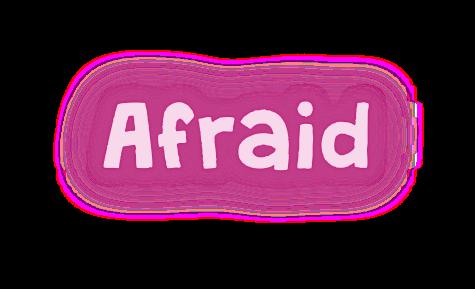Meet Angela! Meet Lionel
Angelafindsherselfbreathingfast, sweating,avoidingthings,having troublesleeping,beingquiet,feeling hesitantandextracareful,and clinigingtoadults

WhatcanAngeladotofeel better?

Talk about what is making you afraid. Sometimes adults can help us understand something better, so it is less scary

Think about why you are afraid. Is it something new? Is it somewhere you’ve never been before?
Hold hands, hug, or be close to someone you trust
Lioneltendstowanttobealone, feelsexcluded,missestheirfriends and/orfamily,losesinterestintheir hobbiesandsometimesdisplays behavioralproblems.




WhatcanLioneldotofeel better?



Plan playdates with friends from school or organizations



If worried about fitting in, think about how being unique is exciting and special

Get involved in extracurriculars like sports, the arts, faith-based organizations
Try a new activity. You never know what you may enjoy if you haven’t tried it!
Talk to an adult you feel safe with and trust
Count to 10, take deep, whole-body breaths
Tell yourself you are brave and strong!
Tell a trusted adult that you might need some encouragement
Loneliness can become something exciting if you’re trying something new
Present:
& Fuzzy Feelings


What to do when difficult things lead to difficult feelings












With
…

Meet Sonya!
Sonyafindsherselffeeling teary,wantingtobealone, losinginterestinhobbies,is tiredduringtheday,andhas troublesleeping
WhatcanSonyadotofeel better?
Sometimes crying can make us feel better! Crying is a very healthy and normal way to express sadness

Talk to a family member or friend about why you’re sad. Talking about our feelings often makes us feel better



Have a snack and some water, sometimes our bodies tell us we need food or water through our emotions
Meet Charlie!
Take a nap. Sometimes we feel a lot of feelings when we are sleepy
Hug a pet, friend, or loved one! Hugs can make us feel better
Play with a friend, a pet, or play a game with a family member
Meet Andy!
Andyfindshimselfyelling,using physicalaggression(kicking,hitting pushing),beingmean,destructing objects,feelingchesttightness, feelingwarmand/orsweaty,and havingaheartthatfeelsfast



WhatcanAndydotofeel better?
Run around, play outside with a friend, pet, or loved one. Our body often feels better when we keep it moving
Count to 10, take deep, whole-body breaths
Talk to a fa you’re
Have a snack and some water, sometimes our bodies tell us we need food or water through our emotions
Take a nap. Sometimes we feel a lot of feelings when we are sleepy



Charlie tends to have a lack of focus, asks lots of uestions, avoids ings, stays close o an adult and eels frustrated
WhatcanCharliedotofeel better?


Ask questions about what is confusing you. We often feel much more comfortable around things we understand and are familiar with
Ask for help if needed! This also helps you learn faster!
Remind yourself that being confused is a normal part of learning and growing. It can be good to be confused because that’s how we learn and get smarter!








Create art or dance to music!
PROTIPSFORHARDTOPICS
DESCRIPTION
Steps to create a safe, comfortable, loving environment where all persons are treated with respect, heard, and feelings are validated
OBJECTIVES
To break the taboo of mental health topics being di�cult and uncomfortable conversations
TEAM
Family members, children, loved ones!
DETAILS
Mental health is a complex and nuanced topic, and it's okay if your child doesn't fully understand everything right away. Be patient, empathetic, and supportive
Having di�cult conversations about mental health with your children can be challenging, but it's important for their overall well-being.
Remember that having open and honest conversations about mental health is an ongoing process that requires patience, empathy, and understanding. With practice and persistence, you can help your child build resilience and develop healthy coping skills to manage their mental health challenges.
OUTLINE
1. Begin by creating a safe and comfortable environment for the conversation. Make sure that you have enough time to have a meaningful discussion without interruptions.
2. Start by asking open-ended questions that allow your child to express their thoughts and feelings about mental health. For example, "What do you know about mental health?" or "Have you ever felt sad or anxious? How did you deal with it?"
3 Listen attentively to your child's responses without interrupting or judging them. Show empathy and understanding by reflecting back on what they have said and acknowledging their feelings

4 Use age-appropriate language: When explaining mental health to a child, it's important to use language that is appropriate for their age and developmental level. Use simple and concrete language that they can understand.
5. Emphasize that mental health is important: Explain to your child that just like physical health, mental health is an important part of overall well-being.
6 Normalize mental health: Help your child understand that it's common for people to experience emotional ups and downs, and that everyone can benefit from taking care of their mental health.
7 Use analogies: Comparing mental health to physical health can be a helpful way to explain the concept to children. For example, just as we take care of our bodies by eating healthy food and getting exercise, we can take care of our minds by doing things that make us happy and spending time with people we love.
8. Be honest: Be honest with your child about mental health and its e�ects. Answer their questions truthfully, but keep in mind their age and emotional maturity.
9. Address stigma: Explain to your child that there is no shame in experiencing mental health di�culties, and that seeking help is a brave and important step. Emphasize the importance of treating mental health conditions with the same care and attention as physical health conditions
10 Encourage communication: Encourage your child to talk about their feelings and emotions, and let them know that it's okay to ask for help when they need it.
11. Emphasize the importance of self-care: Teach your child the importance of self-care, such as getting enough sleep, eating a healthy diet, and engaging in physical activity.
12. Model healthy behaviors: Model healthy behaviors for your child by taking care of your own mental health, and seeking help when needed. This can show your child that mental health is important and should be taken seriously.































